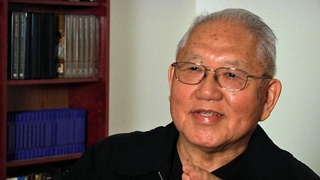Interviews
Gidra Production
There wasn’t really a division of labor, per say. Some people were better at things than others, obviously the illustrations you know, was pretty specialized, but the production of the paper, which meant receiving an article typing it into the format that we used, generating the columns, proofreading them, making corrections, making the physical corrections on the lightbox and then putting ‘em together again and then laying out a page even, everyone did those things.
I know it’s hard to imagine, but if you look at Gidra, you can tell that because some, some of the pages, are pretty bad.
There’s one where someone went crazy with that black tape, we just discovered that. So they put black tape all over and that was their design. But that was also a part of the movement of the time, and was like, “you don’t have to be an expert to do something, just try it." You know there was a lot of that kind of feeling, too, at Gidra we put that into practice.
Date: September 28, 2011
Location: California, US
Interviewer: Kris Kuromitsu, John Esaki
Contributed by: Watase Media Arts Center, Japanese American National Museum



